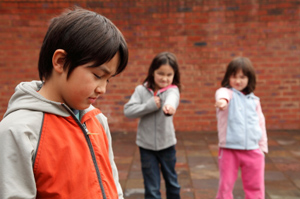Jul 10, 2013
 Those of us that grew up with siblings know how tense childhood home life could be. There were forts to destroy, clothes to steal, and a little brother to bop on the head. Even if you are an only child, you’ve no doubt seen the rivalries in action; it’s a classic trope. As harmless and “innocent” as these interactions may seem to us, a group of researchers at the University of New Hampshire’s (UNH) Crimes against Children Research Center have revealed sibling aggression to be a possible source of long-term mental health harm similar to the effects of peer bullying.
Those of us that grew up with siblings know how tense childhood home life could be. There were forts to destroy, clothes to steal, and a little brother to bop on the head. Even if you are an only child, you’ve no doubt seen the rivalries in action; it’s a classic trope. As harmless and “innocent” as these interactions may seem to us, a group of researchers at the University of New Hampshire’s (UNH) Crimes against Children Research Center have revealed sibling aggression to be a possible source of long-term mental health harm similar to the effects of peer bullying.
Corinna Jenkins Tucker, Associate Professor of Family Studies at UNH and one of the researchers, stated, “Our study shows that sibling aggression is not benign for children and adolescents, regardless of how severe or frequent.”
Dr. Tucker and her colleagues analyzed data from the center’s National Survey of Children’s Exposure to Violence (NatSCEV), which looked at more than 3,500 children aged one month to 17 years. The study included three categories of aggression: physical, property, and psychological. Physical aggression was classified as physical assault with or without injury. Property aggression was defined as intentionally damaging or stealing a sibling’s things. And psychological aggression was defined as attacking a sibling’s emotions or self-esteem. Thirty-two percent of the children studied reported at least one type of sibling victimization.
The study, published in the July issue of the medical journal Pediatrics, revealed the most negatively affected group to be children under the age of 9 who had been mildly physically assaulted by a sibling. These children reported greater instances of anxiety and depression than those aged 10 to 17 who had experienced similar assault. However, all of the children interviewed reported similar reactions to the other types of sibling aggression.
In the past few years, significant awareness has been raised about the negative (sometimes severe) mental health effects of peer bullying. In the UNH press release, Dr. Tucker warned of the implications of this data, which revealed similar outcomes. “If siblings hit each other, there’s a much different reaction than if that happened between peers,” she said. “It’s often dismissed, seen as something that’s normal or harmless. Some parents even think it’s beneficial, as good training for dealing with conflict and aggression in other relationships.”
Dr. Steven Pastyrnak of Helen DeVos Children’s Hospital in Grand Rapids, Mich. also commented on the study to MedPage Today. “It’s not OK for the kids to fight. We really do need to help develop parenting tools…so that we cannot only help the kids who are being traumatized, but also their siblings who are actually doing the bullying, as well,” he said. As the UNH data reveals, bullying is bullying no matter the relationship of the children nor the location of the abuse.
NAMI HelpLine is available M-F, 10 a.m. – 10 p.m. ET. Call 800-950-6264,
text “NAMI” to 62640, or email. In a crisis, call or text 988 (24/7).